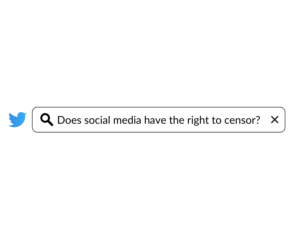Social media as a public good
January 25, 2023
In 2022, the Eleventh Circuit decided that social media companies are privately owned companies and private digital squares. The Eleventh Circuit court is a court of appeals presiding over the districts of Florida, Georgia, and Alabama. This conclusion grounded the basis for social media companies having the authority to restrict and censor speech that the social media company deems unworthy to be on the platform.
However, social media companies are not entirely free to remove content or speech that is deemed unworthy on the platform. According to the Supreme Court, public and private entities are unable to host or promote speech that propose intimate endangerment or lawlessness. In contention, the more proper consensus would be to propose that instead of social media companies being private companies and private digital companies. Social media companies rather are public companies and public digital squares that should be unable to censor content unless the speech is slanderous and harmful.
The error in the Supreme Court ruling precedes that there was lack of consideration that the social media companies functionally operate as public companies that provide communication networks and tools to a great number of people. Regardless of whether or not social media companies economically function as private companies, social media is functionally a public company; social media as a perceived entity. This is shown in the more realistic functions of social media. The function of social media oftentimes is to provide information, news, and official statements from organizations and individuals to users reaching a larger audience more conveniently. The information, news, or official statements that are provided to users on social media are perceptually indifferent to a public company. This correlates to a similar notion that Matthew Gentzkow, an American economist at Stanford University, said, “Social media gives the average person or organization with internet access the ability to reach just as many readers as any major news source.” The indifference of social media to public companies even extends to the users’ perception of social media.
The public’s perception of social media from the perspective of the user radically changes the nature of social media companies. The public perceives social media as a public digital square, which means that social media is an online space for less-restricted dialogue and speech that can be publicly accessed. This was substantiated by the Washington Journal of Law, Technology & Arts, which forwarded that social media functions as a public digital square due to the social media forming the role of a public character that operates through the public.
Pragmatic examples of censorship on social media were shown when Facebook users were banned for posting content that present visual information on the Vietnam war. Facebook considerably banned users and censored content that contained visual information on the Vietnam war, due to the insensitive nature of the image and the immediate danger that it could incite. Eventually, Facebook admitted that the censorship of the visual information was incorrect and reinstated the content of their platform. However, this misinterpretation and improper censorship forwards conversations on the necessity of a public digital square on social media.
Social media companies are public companies and public digital squares, due to both the function and the general census of the public. Social media companies are public companies due to the indifference between the functions of public assets or tools and social media. Secondarily, social media companies are public digital squares due to social media forwarding a public character to the public or users on social media. Ultimately, this was pragmatically shown through the incident on Facebook concerning visual information on the Vietnam war. In this concept, the hope is to inspire individuals to reinterpret the issue involving social media and its nature.

